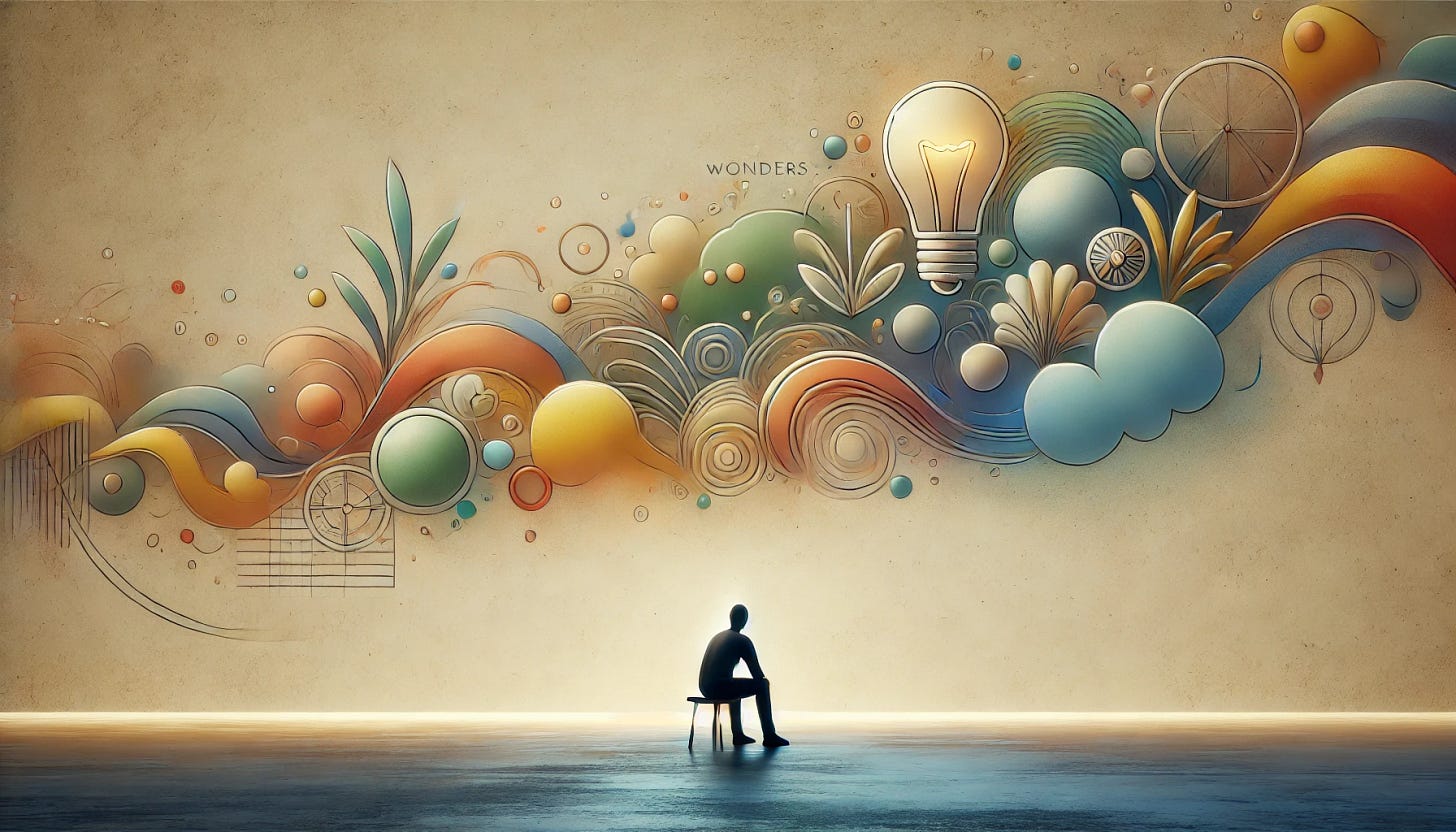Be Bored
It's Actually Kind of Exciting
Welcome to Polymathic Being, a place to explore counterintuitive insights across multiple domains. These essays take common topics and explore them from different perspectives and disciplines, to uncover unique insights and solutions.
Today's topic is boring, but because of that, it’s fascinating, illuminating, and creative. It pushes back on the idea that every second of every day must be curated and stimulating. It tries to pull us back from (un)social media, into the real world, and even a step further into that terrifying place of boredom. From that point, we can unlock the superpower of nothingness to create things beyond our imagination.
Intro
I spend way too much time in front of my computers. I laugh when I step away to read a book and pick up my tablet because the book is on Kindle. In my defense, my online diet is nearly exclusively reading. Yes, I do sometimes indulge in an evening binge of Instagram reels, and my wife and I enjoy sharing fun clips back and forth.
I also intentionally train my algorithm more than many people, allowing me to have an active finger on the scales of the algorithms to be fed better things. I also take my own advice I shared in Apocalypse Always and intentionally search out and feed myself a better diet of positive information.
But back to boredom. This state of being seems counterintuitive because who wants to be bored? Many of us have childhood memories of boredom and the horrible waste of time doing nothing! Parents today seem to fear their own children being bored leading to overstimulation and lack of unstructured play over the past generation. In our industrious culture, many attribute boredom to idleness and view undirected activity with no set intentions as a slippery slope to laziness and sloth.
Collette Greystone, who writes Common Sense, Isn’t, Common, recently published an essay titled Adulting Part Thirteen: Bored Compared to What? where she presents a clear case for the value of boredom. She observed that many Millenials and Gen Z who have stepped away from social media for mental health are now stepping, often for the first time, into the experience of boredom.
But there are two things here:
Being bored isn’t bad.
There are so many other things than social media / digital entertainment that can fill your attention that are very healthy.
Let’s address the second point first and swing back to Collette’s essay. She links through to another fantastic essay by Ted Gioia from The Honest Broker which I found incredibly compelling along with this quote and graphic:
“The tech platforms aren’t like the Medici in Florence, or those other rich patrons of the arts. They don’t want to find the next Michelangelo or Mozart. They want to create a world of junkies—because they will be the dealers.
Addiction is the goal.”

Once we understand that social media isn’t designed to advance our Art or Entertainment but is a Distraction often bordering on Addiction, we have to step back and wonder whether we’d rather have this or boredom! Let’s put this another way. Would you rather do meth or be bored?
And that’s not a specious question because meth and social media addiction are both satiating your dopamine receptors and causing you to lose control. As we explored in Agency vs. Addiction, you have the agency to recognize what is going on and pivot toward healthier habits.
Focus on the World
That pivot is important because there is so much we can replace the addiction of ‘social’ media with that is actually social. We have to step back from the easy button of addiction, past the siren call of distraction, and break into entertainment before we can unlock art. Once there you’ll find an incredible variety of arts all around you.
I’m going to lump more than painting or photography into art because physical arts are crucially important as well. You can join a hiking club, there are biking groups everywhere, and every sport or outdoor activity has groups and teams. There are also martial arts gyms that train all types and capabilities.
Swinging back to the classic arts there are book clubs, (I like the biweekly Virtual Book Club on LinkedIn) sewing, knitting, quilting, and painting clubs. There are also civic arts with volunteering and the chance to revitalize the Elks, Moose, Freemasons, and Rotary civic clubs. Once you step past entertainment you find a plethora of art activities with a healthy social aspect.
I recommend the groups first because we are Homo Socialis and social engagement is our superpower. But it’s not always about groups. Everything mentioned already can be done by yourself. Often I like to work with my hands while listening to music or enjoying a podcast while working on my tractor or driving. Be careful of subscribing to fear and outrage podcasts and focus on ones like Dan Carlin’s Hardcore History a riveting and educational exploration into our past. The selections are endless.
Just Plain Bored
Now let’s go back to that first option and not forget the power of just being bored! This is a state of being that I find harder. To avoid filling the time with new distractions, I take a second, larger step back and allow myself to completely unplug.
Sometimes I go outside and work on my property with nothing but my brain and the task. It allows my thoughts to flow, process tons of information, and be free to do nothing. I sometimes do the same when I drive. I just let myself get into the flow of the road and the landscape and let my thoughts process.
Going for a walk or a hike is also a great way to achieve this. Don’t put in those earbuds; just walk. A good old-fashioned camera can also help focus your attention on the nature around you. Thomas J Bevan captures this idea in Walking as Inactivity:
“The vital thing to understand- and the point that I want to stress the most- is that walking is not an activity. Or rather, it should not be conceptualised as and reduced to being a mere activity. It is much more than that because it is much less than that. Walking is one of the great forms of inactivity”
I also encourage my kids to be bored. When mine complain about having nothing to do my response is typically "Good." If they ask for something to do I tell them "Go outside." When I hear they are bored, screen time becomes a no-go because boredom is too vital a learning and development aid to waste.
The power of boredom is captured well in this article in Psychology Today:
“Boredom naturally fosters the foundational facet of wonder, openness. A ready openness to new experiences and to one’s environment leads to more potential creative insight.”
Author Mark Hawkins also goes into great detail in his book The Power of Boredom covering the superpower that boredom can be in grounding us in life.
When I let my kids lean into their boredom I am giving them the opportunity to let their minds go free. I inevitably find them outside playing some crazy game of imagination, grabbing tools, building forts, and creating things I wouldn’t have thought of and never could have suggested. That’s the power of boredom.

Summary
Stepping away from addiction-prone social media opens up so many more opportunities for true social engagement and even the superpower of just plain boredom. Unplugging and letting my mind wander was how I came up with the ideas for my two novels, Paradox and Integration.
I’ve even turned off the radio for the vast majority of a 5,000-mile road trip last year which allowed me to be with my thoughts, enjoy the landscape, and spend hours just chattering with my wife.1 Stepping away can quickly improve your relationships and appreciation of the world surrounding you.
So go ahead and put down the phone, the distractions, and even the hobby. See how quickly you find your focus shifting from inward to outward. Step into that terrifying place of boredom and then marvel at how many things you see and hear that have been overlooked. Unlock the superpower of nothingness and create beyond your imagination. Be Bored!
What inspirations have you had when you’ve been bored? Please share any other recommendations that can help us rewire and reset.
Enjoyed this post? Hit the ❤️ button above or below because it helps more people discover Substacks like this one and that’s a great thing. Also please share here or in your network to help us grow.
Polymathic Being is a reader-supported publication. Becoming a paid member keeps these essays open for everyone. Hurry and grab 20% off an annual subscription. That’s $24 a year or $2 a month. It’s just 50¢ an essay and makes a big difference.
When you’re done being bored, you can tailor your consumption of content toward more focused and beneficial material.
Refind analyzes thousands of articles and sends you only the best, tailored to your interests. Loved by 503,336 curious minds. Subscribe Here
Or check out these Substack Authors I Appreciate
I highly recommend the following Substacks for their great content and complementary explorations of topics that Polymathic Being shares.
Goatfury Writes All-around great daily essays
Never Stop Learning Insightful Life Tips and Tricks
Cyborgs Writing Highly useful insights into using AI for writing
Educating AI Integrating AI into education
Mostly Harmless Ideas Computer Science for Everyone
My wife and I talk a TON more than what they say the typical couple does on a daily basis. Did you know that studies show spouses with kids spend as little as 4 minutes a day actually talking to each other? That might be extreme and other estimates are more like 45 minutes.









Nice piece on the power of boredom. I may describe this a bit more like “being present” in the moment. When we watch TV or scroll through algorithmically curated slop on social media, we are not truly “present” with ourselves.
Being bored, being present, not distracted, is super difficult, and while I probably wouldn’t recommend it all day long, a few moments of presence a day probably cannot hurt.
I agree with walking or hiking without earbuds. I do that almost daily and consider it the best time to think about what I have read that day or a problem. When I am done walking, I usually have an answer or a path forward to the problem.
Most of the great scientists and thinkers of the past used to walk a lot. Kierkegaard about the virtues of walking. “Above all, do not lose your desire to walk,” Kierkegaard advised a friend in despair. “Every day,” he went on to say, “I walk myself into a state of well-being and walk away from every illness; I have walked myself into my best thoughts, and I know of no thought so burdensome that one cannot walk away from it.”